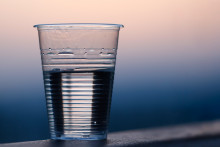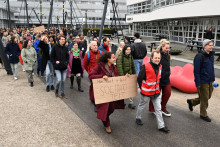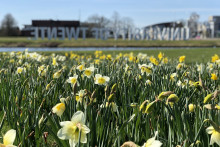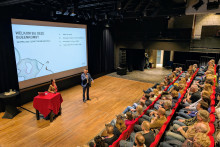‘We started ARISE because we felt there was a need for a group that would allow interdisciplinary research in the fields of sustainability and energy,’ Angele Reinders from the UT explains why she and her colleagues decided to create ARISE. ‘We have members from within as well as outside the UT and we are open for new members from all over the world. Our goal is to design solutions rather than to develop technology. The main pillars of our research are sustainable energy, circular economy and also sustainable transportation.’
‘Plastic in nature is a huge problem’
Today’s symposium in the DesignLab served as an opportunity to network and to better define directions for research on the mentioned themes. One of the event’s speakers was Daniel Poolen, a UT graduate and a former TV presenter, who now fights against the worldwide problem with plastic pollution as the Chief Plastic Officer at Plastic Mining Cooperation.
‘Plastic in nature is a huge problem – 5 to 13 million tons of plastic leak into oceans every year,’ began Poolen. ‘A lot of plastic is then consumed by animals, such as mussels and fish, which means that we eat plastics already. And the effect on our bodies isn’t good. The sources of the problem are 20% ocean based, coming mainly from fishery, and 80% land based with plastic coming from recreational coastal areas, but also for example from washing machines because of small fibers of our synthetic clothing that get into water.’
Bad waste management
‘The main issue is bad waste management. Our current disposal methods are landfilling, burning and dumping of plastics, which can become litter, and consequently become plastic soup. Bad waste management is therefore a serious threat to our planet; instead we could recycle and reuse the materials,’ said Poolen.
Working for Plastic Mining Cooperation, Poolen has helped with waste management of plastic at, for instance, the island of Bonaire. In his words, the main issues at Bonaire were the lack of awareness, the lack of knowledge and the lack of volume, which prevents building of large factories that would deal with plastic waste like they do in other countries. To solve this, Poolen and the cooperation worked with local NGO’s and waste management companies and showed them how to start recycling using small-scale recycling machines.
‘The most important thing is that plastic is contained and does not leak into nature, because plastic is a pollutant,’ explained Poolen. ‘Once it’s contained, you can also make profit, making new products out of it. That is a great example of circular economy.’







